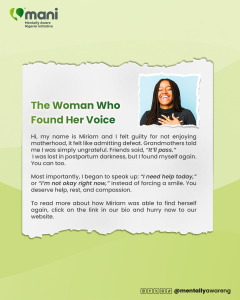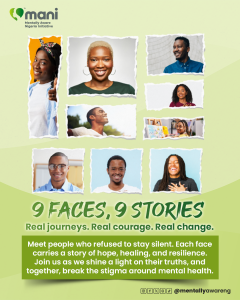
My name is Miriam, and this is my story of finding my voice again.
I was so excited to become a mother. During pregnancy, everyone told me how magical those first weeks would be, how I’d fall instantly in love with my baby, how I’d feel complete. But after my son was born, a heaviness settled in my chest that nobody warned me about. At first, I thought it was just normal “new mom” exhaustion. But when I couldn’t sleep even when he finally did, when I cried uncontrollably at the sight of his tiny fingers, I realized something was wrong.
At home, I felt trapped between two worlds: the joy of holding my son and the shame of feeling sad. Grandmothers told me I was simply ungrateful. Friends said, “It’ll pass.” My husband tried to help, but he didn’t know what to say when I lashed out or retreated to my room for hours. I felt guilty for not enjoying motherhood, it felt like admitting defeat.
One morning, I woke up unable to move. My body shook with panic, and I whispered to my reflection, “Am I really this broken?” Holding my sleeping baby, I knew I needed help. I remembered seeing a post from MANI about postpartum depression and free counselling. Something in me, maybe the same part that used to believe I could fight anything urged me to reach out.
My first session felt like learning a new language. I was on the phone, heart pounding, wondering if this counsellor would think I was weak. Instead, she just said, “Thank you for coming. You’re safe here.” For the first time, I didn’t have to be “the strong mother.” I could be scared, exhausted, and unsure. Each week, I learned how to name my feelings: guilt, emptiness, fear. We discussed small goals, such as taking a fifteen-minute walk, writing in a journal, or asking for help with laundry. These felt insignificant at first, but over time, they became lifelines.
One afternoon, the counsellor taught me a grounding exercise: “Feel your feet on the floor. Breathe in for four seconds. Breathe out for four.” As I tried it, I realized I had forgotten what it was like to breathe without panic. Tears rolled down my cheeks, not because I was sad, but because I was finally feeling something other than doom.
Over the next months, I began to piece myself back together. I joined a support group for new mothers, where I met women who spoke about my silent struggles; fear of judgment, loss of identity, and the ache of loving a baby while hating the weight on my chest. We cried, laughed, and shared tips: “Tell your husband when you need a break,” “Schedule a phone call with a friend,” “Never be ashamed to ask for medication if you need it.” I discovered that healing is not about “snapping out of it”; it’s about tiny steps toward light.
Slowly, I rediscovered myself outside of motherhood. I started painting again, remembering the way colours used to make me feel alive. I texted my old friends, and we talked for hours about our dreams, not just our diapers. When my baby napped, I read books I loved before I became a mom. Most importantly, I began to speak up: “I need help today,” or “I’m not okay right now,” instead of forcing a smile. My son saw me cry, but he also saw me heal and I want him to know that it’s okay to feel everything.
Today, I still have tough days. Sometimes I wake up and the anxiety tugs at my shirt like an invisible hand. But now I have tools: my counsellor’s phone number, a supportive partner who listens, and a community that reminds me I’m not alone. I found my voice by first admitting that I was lost.
If you’re a new mother reading this, please hear me: it’s okay not to be okay. Postpartum depression is not your fault, and it’s not a sign that you’re a bad mom. You deserve help, rest, and compassion. Healing is possible, one honest conversation at a time.
I’m Miriam. I was lost in postpartum darkness, but I found myself again. You can too.

